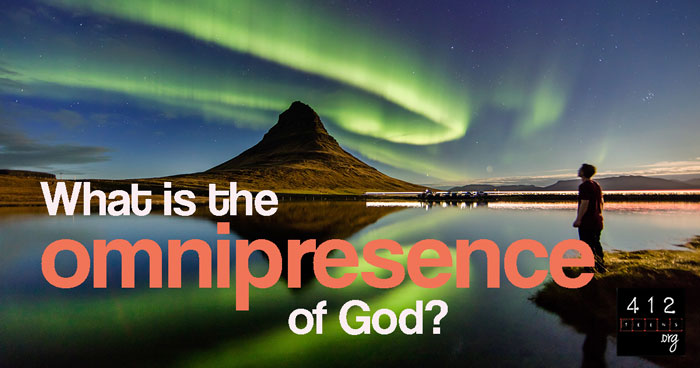What does it mean that God is omnipresent?

Describing God as omnipresent isn't as common as saying He is omnipotent or omniscient, but it is just as much a part of who God is as those other ideas. Omnipresent is sort of self-defining: omni means "all," and present means the same thing it would when taking attendance in a class or at work—here. God is everywhere all at once. As David said in Psalm 139, there is no place where God is NOT. Still, like those other terms, omnipresence has to be understood carefully, otherwise it's confusing.
Where is God?
A quick-and-simple definition of omnipresence is to say "God is everywhere." Of course, God is not physical, like a person or an object (John 4:24). God is not "in" a room in the same way a person is "in" a room; the person can only be in one place at one time. God can be everywhere all at once because He is a Spirit—not a physical being. And since God is all-powerful (omnipotent) and all-knowing (omniscient), He is not limited to a single location the way we are.
The ultimate reason for this is that God actually exists beyond space and time, which we'll explain more later.
When is God?
People often think of God's omnipresence in terms of physical locations, which is why we usually say, "God is everywhere." And yet, it's also true to say that God is every-when. God is just as much beyond time as He is beyond space (Titus 1:2). So just as God can see, know, and control everything in every location in creation, He can also see, know, and control everything in every moment of creation. God is not limited to experiencing only "one time"—at a set speed, in a set order—as we are. God created time and can be "in" the past, present, and future at once, like an infinity symbol or a mobius strip in His hands.
Again, this idea of God being beyond space and time is important, but it can be hard to grasp. So, let's look at some comparisons which are easier to understand.
Watching Movies: Beyond Time
If you watch a movie using a DVD or Blu-Ray player or a streaming service, it's possible to skip to any point in the film you like. In a sense, you are "beyond" the movie's rules of time. Your favorite scene might not happen until 45 minutes into a film, but you don't have to wait for it. You can just go there. Or go back. Or repeat it. Or play it in slow motion. As far as the movie is concerned, things happen in a certain order, along a certain timeline. But you—the movie-watcher, the one with the control in your hand—are not locked into that timeline.
In much the same way, God is not locked into or limited by time. He knows the past and future as much as He knows the present because He's seen this movie. He's within the boundaries of creation's timeline; He's timeless and present in all moments at once.
Solving Mazes: Beyond Space
If you've seen a typical maze on paper, in two dimensions, you know there's a certain path to be followed to resolve it. The line you draw has to go from the start of the maze to the end, without crossing one of the walls. But what's really limited>, in that sense, is the LINE—not you. You, as the maze-solver and the one with the pencil in your hand, can see the entire maze at once. You're not limited to only seeing or "being" in that maze. And you can move in ways that are totally "beyond" the maze's design, like lifting the pencil off from the paper.
In much the same way, God is "beyond" space. We are limited to three dimensions of movement. God is free from those restrictions just as the maze-solver is free to pick up their pencil or look ahead in the maze or go backward from the end. God is "everywhere," somewhat like the person solving the maze is "everywhere" in that maze at once. The solver experiences this interaction from a much greater, deeper perspective than the line, the pencil, or the maze can perceive itself.
Still confused?
All that said, God's omnipresence is not something we can claim to fully understand because our minds are limited by our perceptions of time and space. So if you're still a little confused, it’s OK. Just like God's omnipotence and omniscience, His omnipresence part of what makes Him "more" than us. The smartest ant in all of history might be aware, sort of, of things like cell phones and politics and music. But that ant could never understand those things the same way we do. And we, as human beings, can never fully grasp what God's existence is like. All we can do is our best, which is to put those ideas in human terms and leave the rest to Him.
ALSO SEE:


TL;DR
God's omnipresence means He is "everywhere," in the sense that He is not limited by space. God is not limited by time either, so He is "at" every place of creation and "in" every moment of creation—all at once. Like a person who can skip to any scene in a movie or skip to the end of a two-dimensional maze, God is beyond the limits of space and time. He is every "where" and every "when" simultaneously (Psalm 139:7-12). God's omnipresence connects to and completes His possession of all power (omnipotence) and all knowledge (omniscience).

Writer: Jeff Laird
Jeff is a staff writer with Got Questions Ministries and used to be a mechanical engineer. When he's not accidentally setting things on fire in his workshop, or petting strange dogs, he loves helping people better understand God’s Word and how it applies to our lives. Jeff's calling is to untangle the "big picture" of Christian faith, making it easier to understand.
